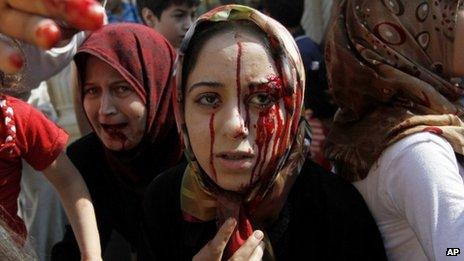Syria air strikes 'target civilians' - Human Rights Watch
- Published

The Syrian Air Force is carrying out both deliberate air strikes against civilians and indiscriminate attacks, a leading rights group has warned.
Human Rights Watch says it visited 52 sites in north-western Syria, documenting 59 such unlawful attacks.
It points out that both types of attacks - estimated to have killed thousands - are serious violations of international law.
It criticises Russia and China for blocking UN action against Damascus.
Between October 2011 and July 2012 they vetoed three proposed UN Security Council resolutions against the Syrian government.
HRW says measures by the UN, such as targeted sanctions, an arms embargo and the referral of the situation to the International Criminal Court, are urgently needed.
It says the Syrian government's unlawful actions are behind many of the 70,000 deaths estimated to have resulted from the conflict.
Opposition bastions
In its report - Death from the Skies - HRW says that since late July 2012 regular air strikes by Syrian Air Force fighter jets and helicopters have been launched on "cities, towns and neighbourhoods under the control of opposition forces".
HRW visited opposition-controlled sites in Aleppo, Idlib and Latakia governorates in the country's north west between last August and December, and spoke to witnesses and victims of attacks, along with four Syrian Air Force defectors. It also saw some attacks at first hand.
Many of the sites it visited had been under opposition control for weeks or months, with no recent ground fighting at the time of the attacks.
Nonetheless, it found evidence that government forces had launched strikes and artillery attacks on bakeries and civilians waiting to buy bread, and on hospitals, with strong evidence those facilities had been deliberately targeted.
In other cases, Syrian forces had used means such as unguided bombs, incendiary bombs (which start fires and can cause casualties over large areas), and large high-explosive munitions whose effects were rendered indiscriminate by the nature of their use.
In dozens of cases, HRW found that, "despite high civilian casualties, damage to opposition headquarters and other structures was minimal and, as far as Human Rights Watch could establish, there were no casualties among opposition fighters".
The four defectors told HRW that commanders ordered strikes on urban areas - despite being unable to take adequate measures to protect civilians - "in part to instil fear in the civilian population in opposition strongholds, and also to deprive the opposition of its support".
The report also documents fresh evidence of the use of cluster weapons, internationally banned due to their indiscriminate nature.
It reserves some of its criticism for opposition forces, saying they had at times put forces and structures in densely populated areas - therefore increasing the risk that civilians could be caught in the crossfire.
But it says that does not absolve Syrian government forces of ultimate responsibility for civilian casualties.